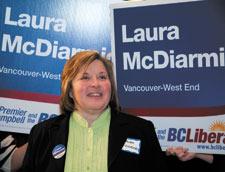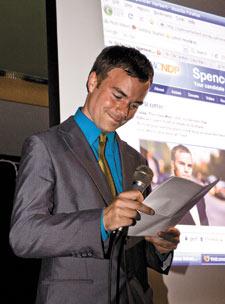
DISAPPOINTED. 'I would have really liked to have been the MLA for the riding, the new riding, but I want to say congratulations to Spencer (shown inset), it was a good fight,' says West End Liberal candidate Laura McDiarmid (above). Credit: Janet Rerecich
Gay MLA Spencer Herbert easily defeated his opponents May 12 to win BC’s gayest new riding, Vancouver-West End, beating lesbian Liberal Laura McDiarmid by 3,927 votes.
Drina Read, the Green Party’s lesbian candidate in the riding, placed third with 1,442 votes.
While Herbert’s win was met with cheers, hoots and a lot of hugging by his supporters gathered in the bar of the Coast Plaza Hotel, his victory was somewhat overshadowed by Gordon Campbell’s return to the premier’s office, as the Liberals increased their majority to 49 seats in the BC legislature to the NDP’s 36 seats.
A record low number of eligible voters turned out this time to maintain the status quo in the province, returning the ruling Liberal party to power and defeating the proposal to switch to a new electoral system (STV).
Of 3,218,480 eligible voters in BC, only 2,948,175 registered to vote. And, of those, only 1,549,059 people actually cast ballots. That’s a turnout of just over 50 percent, the lowest ever in a provincial election in BC.
This was Herbert’s second outing at the provincial polls, and his first general election. He first won the riding’s seat (in its previous incarnation as Vancouver-Burrard) in last October’s by-election.
Herbert will return to Victoria with the same number of openly gay MLAs by his side, though not the same people.
Having won Vancouver-Fairview in last October’s by-election, lesbian NDPer Jenn McGinn could not hang onto her seat this election, losing to her Liberal opponent by 1,162 votes.
But lesbian transit driver Mable Elmore handily won her seat in Vancouver-Kensington by 2,077 votes, making her the first out lesbian to win a seat in Victoria in a general election. She is also the first Filipino-Canadian MLA in BC history.
Powell River-Sunshine Coast’s openly gay MLA, Nicholas Simons, will also return for another term in the legislature.
Of the other gay candidates seeking seats this election, former Pride Society president John Boychuk placed third for the Greens in Vancouver-Mount Pleasant, and NDPer Debbie Lawrance finished second in Surrey-Panorama.
As the election night unfolded at Herbert headquarters, the mood was one of quiet anticipation mixed with apprehension as the possibility of another Liberal majority began to unfold.
With only about 20 people in the bar draped in Herbert signs watching preliminary results, the quiet was interrupted with the occasional cheer as an NDPer pulled ahead.
There was hooting as Herbert passed the 1,000-vote mark and the bar began to fill 15 minutes later when screens showed Herbert at almost double McDiarmid’s results.
Not long after the CBC declared Herbert the clear winner in the West End, there was a flurry of Herbert signs at the door as the MLA and his partner Romi Chandra and their family swept through the room to cheers, hugs and a standing ovation.
“That was a West End welcome,” Herbert said, raising a glass of champagne.
“The West End is good because it is diverse. Tonight is history as we say goodbye to Vancouver-Burrard for the last time. Goodbye Burrard. Hello West End.”
With that, Herbert thanked the community, his opponents and his campaign team.
“You’re worth it,” a woman yelled from the crowd.
Gay postal worker Colin Shotbolt was happy to see Herbert win.
“I think he’s got a great read of the needs of the community,” Shotbolt says. “He understands the issues from the GLBT perspective.”
Now the challenge for Herbert will be to keep pushing the Liberals to deal with the rental crisis in his riding, homelessness and the question of retaining St Paul’s Hospital in the West End.
Another major challenge for the West End, he says, is that of education and violence against the gay community.
“I’m hoping they [the Liberals] have elected some more enlightened people because it’s an issue they’ve not taken to heart or understood,” Herbert says.
Herbert agrees there’s a good chance Delta South’s Wally Oppal will return to the post of attorney general if he wins his riding (which a recount will determine in the coming weeks). Oppal has faced criticism from the gay community over his unwillingness to send a memo to BC’s Crown counsel directing them to seek hate crime designations in all gaybashing cases.
Meanwhile Vancouver-Fraserview Liberal newcomer Kash Heed, the former West Vancouver police chief, could be in the running to be solicitor general, the province’s top cop.
Herbert says he wants to meet with both of them as soon as possible to discuss hate crimes against the gay community and what can be done in the courts to address them.
“It’s beyond party politics; it’s about human life,” Herbert says.
Across town at the new trade and convention centre, Laura McDiarmid breezes into the media- and security-saturated Liberal gathering just past 9 pm, on the heels of CTV’s projection that her party is well on its way to a three-peat in the legislature.
Surrounded by enthusiastic supporters waving placards bearing her name, McDiarmid says she is “very, very excited” about her party’s return to power.
But she confesses she doesn’t know how she’s faring against Herbert. “I know I was behind. I know that much. I don’t know where I am right now,” she admits.
Suddenly she is whisked off by one of the plentiful broadcasters for another interview. While waiting for her airtime, McDiarmid keeps a close eye on four large screens constantly ticking over with interviews, analysis and results, still trying to determine her fate.
By 9:20 pm, CBC calls the West End for Herbert.
McDiarmid’s face registers her disappointment.
“I would have really liked to have been the MLA for the riding, the new riding, but I want to say congratulations to Spencer, it was a good fight,” McDiarmid concedes. “We both showed a lot of respect for one another throughout the campaign.”
Musing on her loss, McDiarmid says there are a “few incidences that disturbed me,” noting that “a couple of times my words were taken out of context and for that I feel bad.”
She refers specifically to the highly contentious issue of tenants’ rights. She accuses the NDP of erroneously portraying her views as “being not caring and not concerned about the renters.”
“Especially with the renters, I think that people need to understand that I would have been there for everyone that needed some help — as their representative, as their MLA — and you know it seemed to me that it was a bit skewed in terms of how that was demonstrated or how that was portrayed, and it’s unfortunate,” McDiarmid says.
Regardless of the results, McDiarmid says she’s “not going away” and wants to make sure that the riding is rebuilt. She says she’ll be keeping a close eye on Herbert.
“Spencer’s made a lot of promises to the people of the West End and I’m still going to be the eyes and ears, and I’m going to be watching,” McDiarmid promises. “I’m going to make sure that people are served in a way that respects all the residents and all the diversity of the residents.”
Gay West Ender Greg Elzinga describes McDiarmid as a “natural candidate” but says it took a while for the Liberals to find someone to run in the riding after Liberal Arthur Griffiths lost to Herbert in the October by-election following the resignation of Lorne Mayencourt who ran unsuccessfully for the Conservatives in last fall’s federal election.
“Unfortunately, it was late in the game by the time [McDiarmid] got into it,” says Elzinga, who worked briefly on her campaign.
Herbert’s approach to his campaign was a “textbook” example of what an MLA should do when they win an election and face another six months later, Elzinga notes.
“He didn’t take it for granted when he first won over Arthur Griffiths.”
Another gay McDiarmid supporter, Dean Dillabough, also a West End resident, thinks if more people had worked on her campaign and gotten to know her more, McDiarmid would have prevailed over Herbert “hands down.”
“I met her tonight. She’s an amazing lady, the five minutes I got to talk to her,” Dillabough says. “It’s very sad, actually.”
Meanwhile, at the Green Party’s election night headquarters the mood was subdued.
Twenty-six of the party’s candidates, its volunteers and nearly 100 supporters gathered at an Eastside restaurant in Tinseltown just after 8 pm. They ate, mingled and anticipated a change that would not come.
Vancouver-West End candidate Drina Read and her partner Patty Mucklow were among those watching the night’s results.
“You put out your best energy and talk to people in the community,” Read says.
Asked why the gay community should have voted Green, Read says the party’s platform is largely focused on inclusion.
“One of [the Green Party’s] key values is diversity,” she says. “We’re part of an international Green movement. Diversity in humans as well as diversity in nature is very important to us. We’ve always supported gay marriage, equal opportunities in employment and housing. Our values fit in perfectly with the queer community.”
The restaurant grew quiet as it became apparent that the Greens would once again not secure a seat in the legislature, which would instead continue to be split between the Liberals and the NDP.
“We’re stuck with the same sandbox politics of a bunch of kids kicking sand in each other’s faces,” says a disappointed John Boychuk, who ran unsuccessfully for the Greens in Vancouver-Mount Pleasant.
“We are going to see this province go through some real hell times,” he predicts.
Damian Kettlewell, deputy leader of the BC Green Party who came a distant third in Vancouver-False Creek behind Liberal Mary McNeil and Ray Lam’s replacement, Jordan Parente, is also disappointed with the results.
But the party worked hard and has had some impact on policies like the carbon tax, Kettlewell notes.
Even as the assembled Greens expressed disappointment in the riding results, they waited with baited breath for news of the referendum on electoral reform.
The BC Single Transferable Vote (BC-STV) system would have allowed for proportional representation where voters could rank their preferences for multiple candidates as an alternative to the current first-past-the-post voting system.
The Greens actively supported BC-STV saying it would lead to a fairer democracy and open doors for greater representation of minority groups.
“If this were to pass, you’d have more minorities, more Natives, more gays, more women in parliament,” claims Dan Kashagama, the defeated Green candidate for Surrey-Green Timbers.
Those hopes were quashed as the announcement came shortly after 10 pm that BC-STV had seemingly failed.
For STV to succeed, it will need to win in 51 of BC’s 85 ridings, as well as garner 60 percent support in the province as a whole.
Though the referendum results are still being counted, as Xtra West goes to press preliminary results show 38.75 percent of voters favoured STV province-wide, and the system garnered more than 50 percent of the votes in only seven ridings.
Elections BC says final results will be available May 27.
This year the Green Party’s total percentage of votes cast was 8.14 percent, compared to 9.2 in 2005 and 12.4 in 2001.
Despite the drop in votes and record low voter turnout overall, Green candidates and their supporters say they will continue to stand behind their party.
“I’m very committed to the issues,” says Read. “Social justice, environment, no government waste; those are the top three for us and I’m not stopping.”


 Why you can trust Xtra
Why you can trust Xtra


